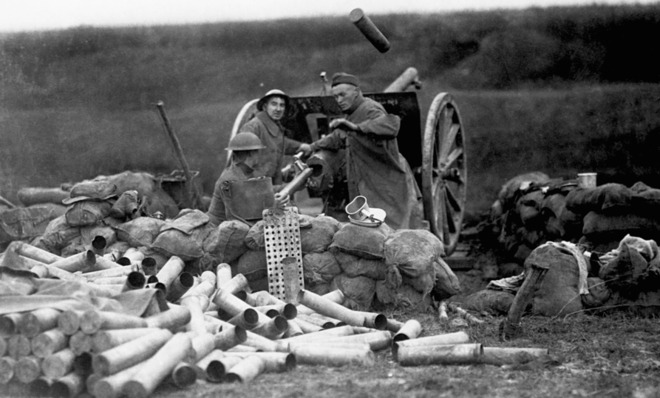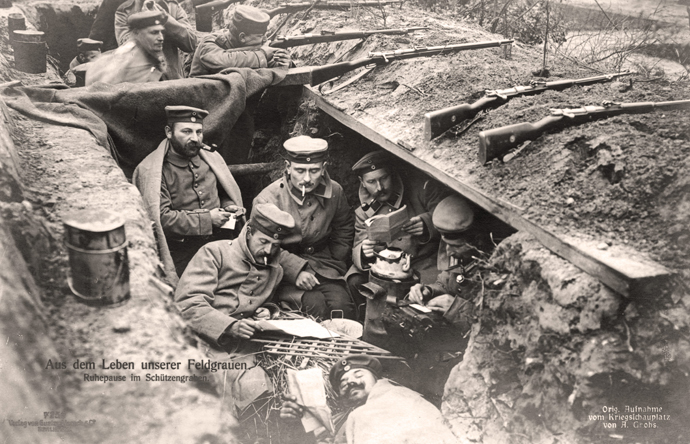11 words and phrases popularized by World War I
Camouflage, shell shock, and more


A free daily email with the biggest news stories of the day – and the best features from TheWeek.com
You are now subscribed
Your newsletter sign-up was successful
This year will mark the 100th anniversary of the start of the First World War. The Oxford English Dictionary is honoring the centenary with an appeal to the public for help in finding the earliest documented uses of words that first came into English during World War I. The current citations for these words are from magazines and newspapers, but there may be earlier examples in personal letters, soldiers' diaries, or government records. Can you find earlier uses? Submit your evidence and help the OED capture the history of our language.
1. CAMOUFLAGE
Camouflage had been used in French to mean "disguise" since the 19th century. The earliest evidence of its use in English, in reference to hiding weapons from the enemy, comes from 1916.
The Week
Escape your echo chamber. Get the facts behind the news, plus analysis from multiple perspectives.

Sign up for The Week's Free Newsletters
From our morning news briefing to a weekly Good News Newsletter, get the best of The Week delivered directly to your inbox.
From our morning news briefing to a weekly Good News Newsletter, get the best of The Week delivered directly to your inbox.
2. SHELL SHOCK
A 1915 study by psychologist Charles Samuel Myers, titled "A contribution to the study of shell shock," is the first documentation for the use of this term in English. "But some accounts suggest that Myers did not invent the term; that it was already in use at the front and Myers merely popularized it (and regretted it: in a later book he described shell shock as a 'singularly ill-chosen term')."
3. JUSQU'AUBOUTISTE
Jusqu'au bout, "until the end" in French, was the basis for the formation of this noun referring to someone willing to stick it out until the bitter end, to carry a conflict to extremes without worrying about the consequences. The earliest example is from a 1917 issue of Punch, but the use of "jusqu'au bout" in English to describe the attitude goes back at least as early as 1915, so the noun may have been formed earlier.
A free daily email with the biggest news stories of the day – and the best features from TheWeek.com
4. DEMOB
Short for demobilization. The first quotations for both the noun and verb form come from 1919.
5. STREETCAR (MEANING "A SHELL")
The earliest citation for this slang term is from 1920, but the novelist Raymond Chandler claimed in a 1950 letter that this had been one of "the most commonly used words of soldier-slang" when he served in WWI. There may be more evidence out there for this one.
6. CONCHIE
Short (and usually derisive) for "conscientious objector." The earliest quote comes from a 1917 Daily Mail article. Britain began military conscription in 1916.

7. TRENCH FOOT/MOUTH
The trench warfare of WWI was brutal, and the environment of the trenches where soldiers spent so much time led to painful conditions they called trench foot, and trench mouth. The earliest printed evidence for these terms comes from 1915 and 1917, respectively.
8. TANK (AS A VERB)
The military tank was first used in 1916 and the word has been used as a noun ever since, but we only have evidence of tank used as a verb in the sense of "attack with a tank" or "travel by tank" since 1930. The OED editors say that while "there is plenty of earlier evidence for the verb tank relating to the noun meaning 'large receptacle', we find it surprising that there are no earlier uses of the verb relating to the military vehicle. Is there evidence we haven't found yet?"
9. EYETIE
Also spelled as "iti" or "eyety," this was a slang term for an Italian. The earliest evidence for this form is a 1919 quote claiming that "our army in Italy always spoke of the Italians as the 'Itis' (pronounced 'Eye-ties')."
10. ZEPPELINS IN A CLOUD
This phrase was used to mean "sausage and mashed potatoes," according to a 1925 dictionary of Soldier & Sailor Words. But so far no pre-1925 documentation has been found.
11. SAM BROWNE (MEANING "AN OFFICER")
Army officers used to wear something called Sam Browne belts in the 19th century, and that gave rise to the use of Sam Browne as a slang term for officer during WWI, though the first evidence for the use is from 1919.
The list of OED appeals for WWI words is here, and you can find out more about what kind of evidence they're looking for and how to submit it here.
Arika Okrent is editor-at-large at TheWeek.com and a frequent contributor to Mental Floss. She is the author of In the Land of Invented Languages, a history of the attempt to build a better language. She holds a doctorate in linguistics and a first-level certification in Klingon. Follow her on Twitter.
-
 A dreamy long weekend on the Amalfi Coast
A dreamy long weekend on the Amalfi CoastThe Week Recommends History, pasta, scenic views – this sun-drenched stretch of Italy’s southern coast has it all
-
 Can foster care overhaul stop ‘exodus’ of carers?
Can foster care overhaul stop ‘exodus’ of carers?Today’s Big Question Government announces plans to modernise ‘broken’ system and recruit more carers, but fostering remains unevenly paid and highly stressful
-
 6 exquisite homes with vast acreage
6 exquisite homes with vast acreageFeature Featuring an off-the-grid contemporary home in New Mexico and lakefront farmhouse in Massachusetts
